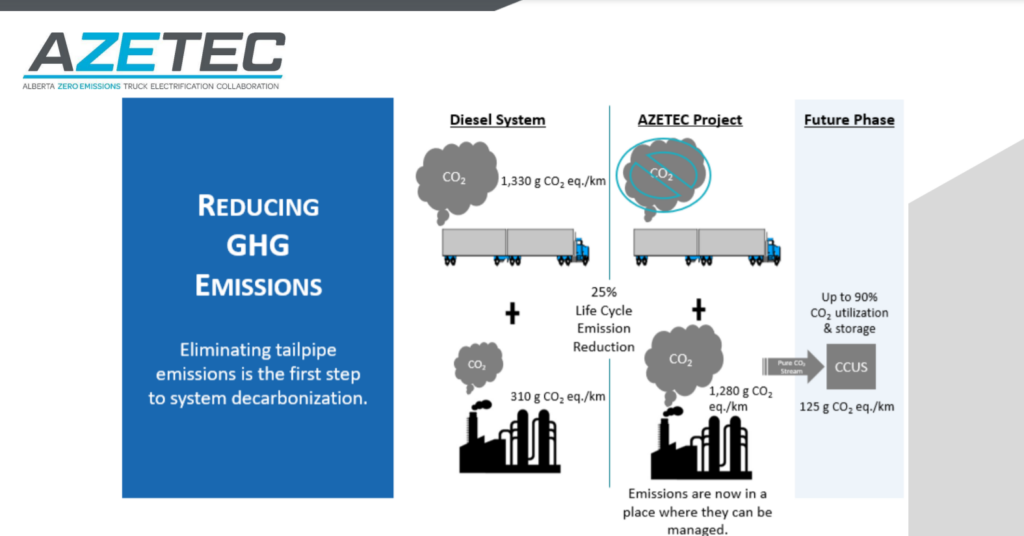Alberta’s hydrogen fuel cell truck project pushing on through Covid-related delays
VANCOUVER, B.C. – An Alberta project that will put hydrogen fuel cell-powered electric trucks on the road has been pushed back due to the Covid-19 pandemic.
The first fuel cell trucks, to be operated by Bison Transport and Trimac Transportation were initially supposed to be on the road in July, with on-highway testing running until December 2022. But the pandemic put the design stage on hold, and testing will now run from October 2021 until April 2023.
Marcel Pouliot, v.p. of industry and regulatory affairs with Trimac, gave an update on the Alberta Zero Emissions Truck Electrification Collaboration (AZETEC) during the recent f-cell HFC Vancouver virtual conference.
“The timetable for the design and build phase was impacted by Covid,” he said.
But the delay has brought a benefit. When the $16.6-million program was launched in 2018, it was difficult to find hydrogen fuel suppliers to participate, Pouliot admitted.
“My sense at the time was these firms identified fuel cell trucks on their future roadmap, but not right now. Fast-forward to today and we have several who have voiced interest in joining the AZETEC partnership, so we have fuel when our trucks come out next year,” Pouliot said.
The AZETEC project will see two trucks put through their paces hauling actual loads between Calgary and Edmonton, pulling double trailers or B-trains at a gross vehicle weight of 63,500 kgs. There are three objectives of the program: to guide the technology to fit Canadian requirements without impacting efficiency and the cost to the supply chain; to create a compelling solution for the trucking sector to engage in the zero-emissions pathway; and to kickstart a hydrogen economy in Canada.
Pouliot said the on-road freight segment of Canada’s transportation sector contributed 61 million tons of greenhouse gases last year.
“We can clearly state that trucking is poised for innovation,” he said, citing advancements in zero emissions technologies and trucking’s 60-plus year reliance on diesel.
Bison and Trimac will require a range of at least 700 kms between fueling and the trucks must generate zero tailpipe emissions. The hydrogen will be produced using Aberta-generated natural gas, via steam methane reforming.
Pouliot said diesel-powered trucks running the Calgary-Edmonton corridor today generate about 1.7 kg of CO2 per kilometer; 80% comes from the tailpipe emissions, and 20% from the production of diesel fuel. Hydrogen fuel cell trucks present an opportunity to slash that 25% to 1.3 kg per km, with zero tailpipe emissions. In the future, a 90% reduction to 125 grams/km is possible when the hydrogen can be produced using carbon capture methods, Pouliot explained.

AZETEC partners include Ballard, which is providing the hydrogen fuel cell units and overseeing the design of the storage system, Freightliner, which provided two glider kit Cascadias, Dana, which will provide the drivetrain and e-propulsion technologies through its Montreal-based Nordresa subsidiary, and the Alberta Motor Transport Association, which oversees the project.
Nicolas Pocard, Ballard Power Systems director of marketing, said hydrogen fuel cells represent the best opportunity in the next 10 years to better the current total cost of ownership for truck operators. Battery-electric trucks compromise payload and take too long to charge, he noted. Hydrogen fuel cell trucks can be fueled in 10 minutes, so utilization isn’t impacted, and payload isn’t compromised.
There are 3,400 fuel cell trucks on the road today, Pocard added, mostly in China.
“We believe hydrogen fuel cell vehicles will offer the lowest TCO compared to battery electric and internal combustion engines in the next 10 years,” he said, citing several studies.
Have your say
This is a moderated forum. Comments will no longer be published unless they are accompanied by a first and last name and a verifiable email address. (Today's Trucking will not publish or share the email address.) Profane language and content deemed to be libelous, racist, or threatening in nature will not be published under any circumstances.
Why wait till October and start now. The technologies is already in place, I suppose you will be using Ballard Power fuel cells for this.
what is the latest news on this project? I am having difficulty finding any recent information.